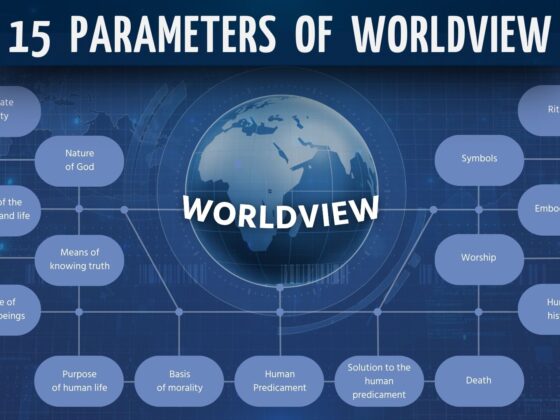Grasping God’s Nature: Assessing Students’ Biblical Worldview Maturity (Parameter 02 – Nature of God)
January 21, 2025
Note: This article is the second in a 15-part series about the parameters of a worldview. You’ll find links to the other articles at the end of this blog post as they become available. If you haven’t read the previous worldview parameter articles, start with part 1 here: Ultimate reality.
Evaluating the biblical worldview maturity of students is a challenge faced by many Christian school leaders. With the complexity of worldview development, it can be difficult to discern how well students truly grasp and live out their faith. As leaders in Christian education, it’s vital to assess students’ biblical worldview because it forms the foundation for their behaviors, attitudes, and decision-making. But how do we evaluate the maturity of this worldview?
Ask yourself: How confident are you that your students truly understand and live out a biblical worldview? This question should serve as a springboard for reflection. It’s not just about academic achievement but about shaping their hearts and lives to reflect God’s truth. By understanding the key components of a biblical worldview and assessing where students are in their spiritual maturity, you can ensure that your school provides the most effective environment for growth.
- Why Teach a Biblical Worldview?
- Shining Light on a Biblical Worldview: Key Ideas for Student Understanding
The Biblical View of God: Core Characteristics and Their Impact on Worldview
At the heart of a biblical worldview is a clear understanding of God’s nature. How students view God impacts every aspect of their lives—how they make decisions, interact with others, and understand their purpose.
- God as Love (1 John 4:8): The foundation of a biblical worldview is love. God’s love compels students to exhibit love and grace toward others, shaping their relational behaviors.
- God as Holy (Isaiah 6:3): God’s holiness is not just an attribute; it is a call for moral living. Understanding God’s holiness influences students’ ethical decisions, pushing them toward righteousness and away from sin.
- God as Just (Psalm 89:14): The Bible reveals that God is just. This understanding shapes students’ sense of fairness, their perspective on justice, and how they engage in conflict resolution.
- God as Omnipotent (Jeremiah 32:17): Recognizing God’s omnipotence influences students’ trust in Him. When students know that God is all-powerful, they can confidently surrender their worries and decisions to His control.
- God as Omniscient (Psalm 147:5): Understanding that God is all-knowing shapes students’ views of truth. This awareness helps them value wisdom and discernment in their decision-making.
- God as Sovereign (Psalm 103:19): When students grasp God’s sovereignty, they develop a sense of peace and trust, recognizing that nothing is outside of His control.
- God as Merciful (Ephesians 2:4-5): God’s mercy leads students to extend forgiveness and compassion to others, fostering an environment of grace and reconciliation.
Worldview Comparison: How Different Perspectives Understand God
A biblical worldview is distinct from other perspectives. Understanding how different worldviews view God can highlight the importance of nurturing a biblical worldview in students.
- Naturalism/Secular Humanism: Naturalism rejects the idea of a personal God, often denying any supernatural influence on life. Instead, morality is seen as human-constructed, and ethical behavior is subjective, shaped by cultural norms rather than divine principles.
- Pantheism/New Age: Pantheism presents God as an impersonal force. In this worldview, students often view morality and relationships as abstract, lacking personal accountability. Without a personal God, ethical decisions become disconnected from divine intent.
- Theism/Biblical Christianity: In contrast, the biblical worldview asserts that God is personal, triune, and sovereign. This view shapes students’ morality by rooting their ethical decisions in a relationship with a personal God. With God’s active involvement in their lives, students’ actions reflect a deeper purpose and responsibility.
Evaluating How Students Grasp the Biblical Understanding of God
As Christian educators, assessing students’ biblical worldview is crucial. It’s not just about knowing facts; it’s about ensuring that students internalize their understanding of God in a way that shapes their decisions and relationships.
When you assess your students, consider the following:
- Are they reflecting on God’s nature in their actions?
- Do their decisions align with a biblical understanding of who God is?
- Are their views of God internalized or merely intellectual knowledge?
These questions will help gauge whether your students truly grasp the personal and sovereign nature of God. Assessing worldview maturity is about understanding how students integrate biblical truths into their daily lives, beyond academic understanding.
Practical Implications: How a Biblical View of God Shapes Behavior
Understanding God’s nature is not just an academic exercise; it profoundly influences how students behave. As students internalize a biblical view of God, their behavior in and out of the classroom becomes more Christ-like.
Beliefs about God directly impact students’ ethics and relationships. When students understand God as loving, holy, just, omnipotent, omniscient, sovereign, and merciful, they are more likely to exhibit similar qualities in their own lives. For example, when a student understands God’s holiness, they will pursue personal holiness. Similarly, recognizing God’s mercy compels them to show grace to others.
Discipleship is key in guiding students to internalize these attributes of God, shaping their worldview to align more closely with biblical principles. This discipleship process is ongoing and requires intentional effort to help students integrate their faith into all aspects of their lives.
Next Steps for Christian School Leaders
As Christian school leaders, it is essential to take proactive steps in developing and nurturing students’ biblical worldviews. Here are a few key strategies:
- Use a worldview assessment: Assessing students’ beliefs, behaviors, and attitudes related to God’s nature will give you insight into their worldview maturity.
- Develop intentional curriculum: Create a curriculum that emphasizes the attributes of God, helping students deepen their understanding of Him and apply that knowledge to their lives.
- Mentoring strategies: Pair students with mentors who can model Christ-like behavior and guide them in developing a biblical worldview.
- Encourage reflection: Encourage students to reflect on how their understanding of God shapes their decisions and interactions with others.
If you’re unsure of where to start, consider using tools like our biblical worldview survey. This survey can give you valuable insight into where your students stand and help you target areas for growth.
- Overcoming Obstacles to Using the 3d worldview survey (if you are ready, but your team isn’t)
- 15 Parameters: A Practical Worldview Toolkit for Christian Educators
Closing Thoughts
Assessing students’ worldview maturity is not a one-time task but a continuous process. As Christian school leaders, we are entrusted with the responsibility of guiding students toward a deeper, more mature understanding of God and His impact on their lives. This process involves not only evaluating their beliefs but also shaping their behaviors through discipleship and intentional mentorship.
Reflect on how your school is fostering a biblical worldview. Are students’ views on God being actively nurtured and assessed? How can you further integrate these principles into your leadership, curriculum, and mentorship? By addressing these questions, you’ll be better equipped to guide your students toward a mature and transformative biblical worldview.
What Is the 3-D Worldview Survey?
- Take the 3-D Worldview for yourself
If you haven’t yet used the 3DWS with your class, check out the free pdf, 10 Questions to Understand Worldview linked below to get started.
#biblicalworldview #3dworldview #assessingworldview
All the Articles in the Worldview Parameter Series – links
- Ultimate reality
- Nature of God (this article)
- Origin of the universe and life
- Means of knowing truth
- Nature of human beings
- Purpose of human life
- Basis of morality
- Human predicament
- Solution to the human predicament
- Death
- Human history
- Worship
- Embodiment
- Symbols
Rituals





